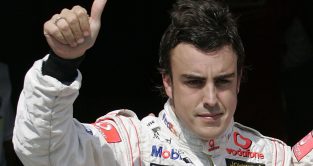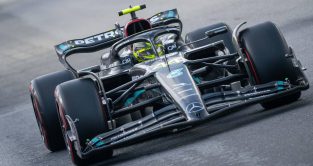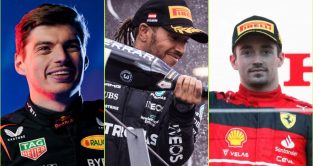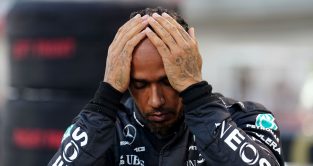The surprise F1 driver that shares same ‘natural talent’ as Lewis Hamilton
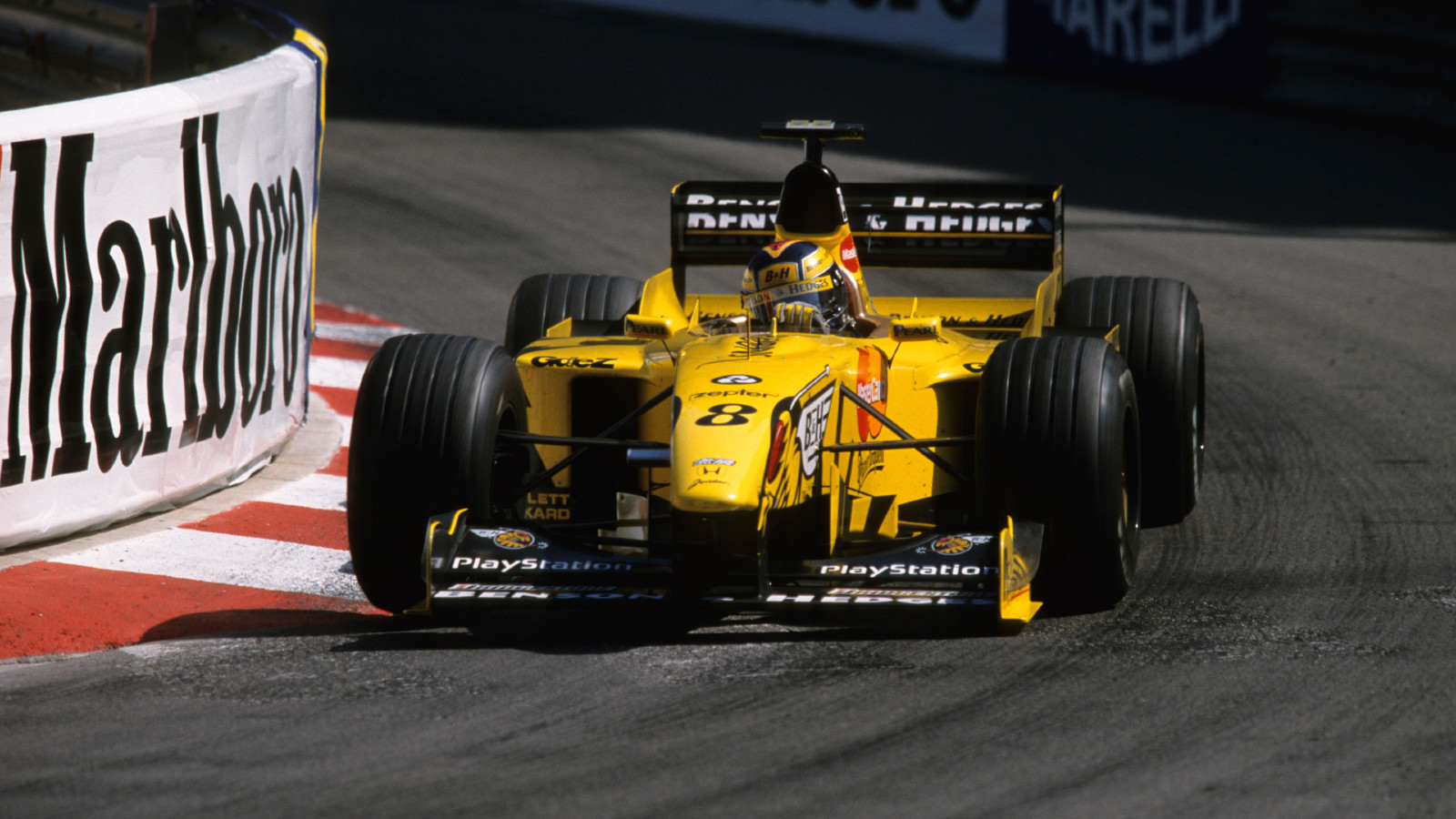
Former F1 engineer Sam Michael has revealed Heinz-Harald Frentzen displayed the same natural raw ability as Lewis Hamilton.
Now working in Australian Supercars, having returned to his home country almost 10 years ago, Sam Michael had a long career in Formula 1 as an engineer and technical director at Williams, as well as a few years at McLaren as sporting director.
Having had the chance to work with Lewis Hamilton at McLaren, Michael unsurprisingly highlighted the now-seven time World Champions’ raw ability as being amongst the strongest he’d ever seen in F1, but mentioned a surprising name as another.
Between 1997 and 2001, Michael had worked with the Jordan Grand Prix team as a race engineer to both Ralf Schumacher and Heinz-Harald Frentzen.
Frentzen had been a star of Mercedes’ sportscar programme alongside Michael Schumacher but, while Schumacher made an immediate impact on F1 and won two World titles early on, Frentzen struggled to make a name for himself as he joined Sauber in the mid-90s. A move to World Champions Williams for 1997 looked set to propel him into the limelight, but Frentzen struggled to cope with the environment at Grove, and failed to match the performances of teammate Jacques Villeneuve.
But Frentzen’s career sparked into life in ’99 as he joined Jordan. The usually midfield team produced a highly competitive car for 1999, and Frentzen clicked well with the working environment and team owner/boss Eddie Jordan.
Frentzen would win two races in 1999, and was even an outside contender for the Drivers’ Championship behind Mika Hakkinen and Eddie Irvine, until a technical problem at the Nurburgring while on for the win all but wrote off his challenge.
Sam Michael highlights Heinz-Harald Frentzen’s strengths
Speaking on theBeyond the Grid podcast, Michael was asked to name the drivers he’d worked with who had the most natural talent.
“Lewis Hamilton, and Heinz-Harald Frentzen,” he summed up.
“Everyone’s heard of Lewis, not as many people have heard of Frentzen. But if you’re talking about pure, natural driving talent, Lewis and Heinz are for sure.
“Just the things that you saw them do in tricky circumstances, extract value and laptime out of cars that they had no business doing and compared to their teammates, everything just stacked up. So Heinz-Harald Frentzen at Jordan, and Lewis Hamilton at McLaren.
“I think that the race performances were also everything. There’s the whole package in terms of driving ability. So, if you focused on talent, they’re pretty much getting that in qualifying and the race.”
With Frentzen moving across to Jordan from Williams at the end of ’98, Michael explained that the German driver made an immediate impression at a test at Suzuka.
“他来到工厂,做了一次政变le of seat fittings with Andy Stevenson and myself on a weekend because he then went on to do the test post-Suzuka, end of ’98,” he said.
“The thing I realised really quickly with Heinz was he was trying really extreme things on setup around Suzuka in that test.
PlanetF1.com recommends
Franz Tost names the driver he wanted to sign but who Red Bull bosses ‘rejected’
Red Bull concede ‘there are no copyrights’ on concepts as teams copy the RB19
“The set-ups were very extreme, almost to the point where you knew it wasn’t going to work. But the thing that I noticed was Heinz could drive these set-ups, for a start that in itself was impressive.
“Then you sort of realised that he was creating an envelope for himself to understand where the car worked, I think he just wanted to build a mesh if you like, so ‘OK, this is what it does when I do this to it’.
“So my first impression, because I was his race engineer at that point, it was sort of chaotic. But then, afterward, you realised actually he was just sort of putting these points down, ‘OK, it does this when I go there’.
“So it was really enjoyable, he definitely thought outside the box, and he was quite happy to try things that were just crazy out there in terms of setup.”
With Frentzen securing third in the championship in what was Jordan’s most successful season in the sport, neither he nor the team were ever able to match those highs again. The 2000 car was less reliable, while Frentzen struggled for authority alongside new teammate Jarno Trulli. By mid-2001, Frentzen’s relationship with Jordan had deteriorated, and Frentzen was unceremoniously dumped from the driver line-up by season end.
The German driver would go on to race for the beleaguered Prost and Arrows squad, as well as a season of redemption at Sauber in which he scored a podium in his penultimate race. But Frentzen’s career ended at the end of 2003, having never quite managed to hit the heights his potential suggested.
“There are a lot of things that make up a driver and their package,” Michael said, when asked why things had played out that way for Frentzen.
“It’s not only their natural driving ability, it’s their ability to communicate with people and work inside a team. The ability to manage your emotions, and understand when it’s a good time to be emotional when it’s not. There’s also the teamwork, working with mechanics and engineers around you and extracting the most from them.
“All those things stack up to make a total driver. Although I never worked with him you’d have to look at someone like Michael [Schumacher], because he was on the opposite side of the fence. He was pretty much ticking all the boxes in that regard. In the early years, it was Michael and Heinz and Karl Wendlinger, who were the three main superstars out of the Mercedes sports car program.
“One of them went on to become a seven-time world champion, and the fact that Heinz didn’t achieve that there are lots of other factors that add up to that result.”
Michael reflects on Frentzen’s sole championship challenge
With Frentzen arriving at Jordan under a cloud after his two tough years with Williams, he was greeted by a perfect storm of circumstances in that the car was surprisingly competitive, Michael Schumacher was ruled out of contention due to his leg-breaking accident at Silverstone, and teammate Damon Hill was showing up merely to obey his contract – the 1996 Champion having decided to retire at the end of the year.
With eventual Champion Mika Hakkinen making numerous unprompted errors, Frentzen’s championship hopes were fully alive as he led the chaotic race at the Nurburgring, only for an anti-stall system to inadvertently trigger after a pitstop and force him to retire – all but ending his title tilt.
“There was a piece of software called anti-stall software,” he said.
“At that time, in the regulations, it wasn’t defined very tightly. What we realised is that you could use the anti-stall mechanism to trigger at certain revs, you could basically set the throttle position for whatever the anti-stall was. So you could lower the revs on the start, get much closer to the stall limit, and get better traction off the line. So it sounds really good but I don’t think the benefit was worth it as soon as you lost any points.
“We’d never used it in the pit lane, only ever at a Grand Prix start. Unfortunately, what happened is during Heinz’s pitstop, the system triggered and we never looked at it – it was the first time that it ever happened. I think it was probably about 10 seconds later, we realised what had happened and it had triggered the system that was only meant for Grand Prix starts.”
What might have been for Frentzen had that anti-stall not kicked in? Michael revealed that, out of all the employees at Jordan, Frentzen was one of the only ones convinced the car was capable of bringing them to a title.
“I think there was probably various points where the only person who could have believed it was Heinz, because he’s driving the car, so he knew the competitiveness of the car right from the beginning of testing,” he said.
“I remember him coming back in the early sessions. We were good, but we weren’t like winning good. But he knew that it was there. So he had more confidence and more confidence in us. But I think for where we had been as a team, winning a Grand Prix with Damon [Hill] and Ralf [Schumacher] in second and, if you go just before that, we were almost game over.
“Only a year before, we couldn’t even get any points. Yet here we were potentially fighting for a driver’s championship. So it was a dramatic change.
“The season is made up of lots of different things and probably the gutting thing about that is I remember everyone said ‘Oh, you’re exploiting a system’. That’s what everyone does in F1, isn’t it? But the worst thing is, I don’t think it was actually worth that much, but things tends to be like that, doesn’t it?”



